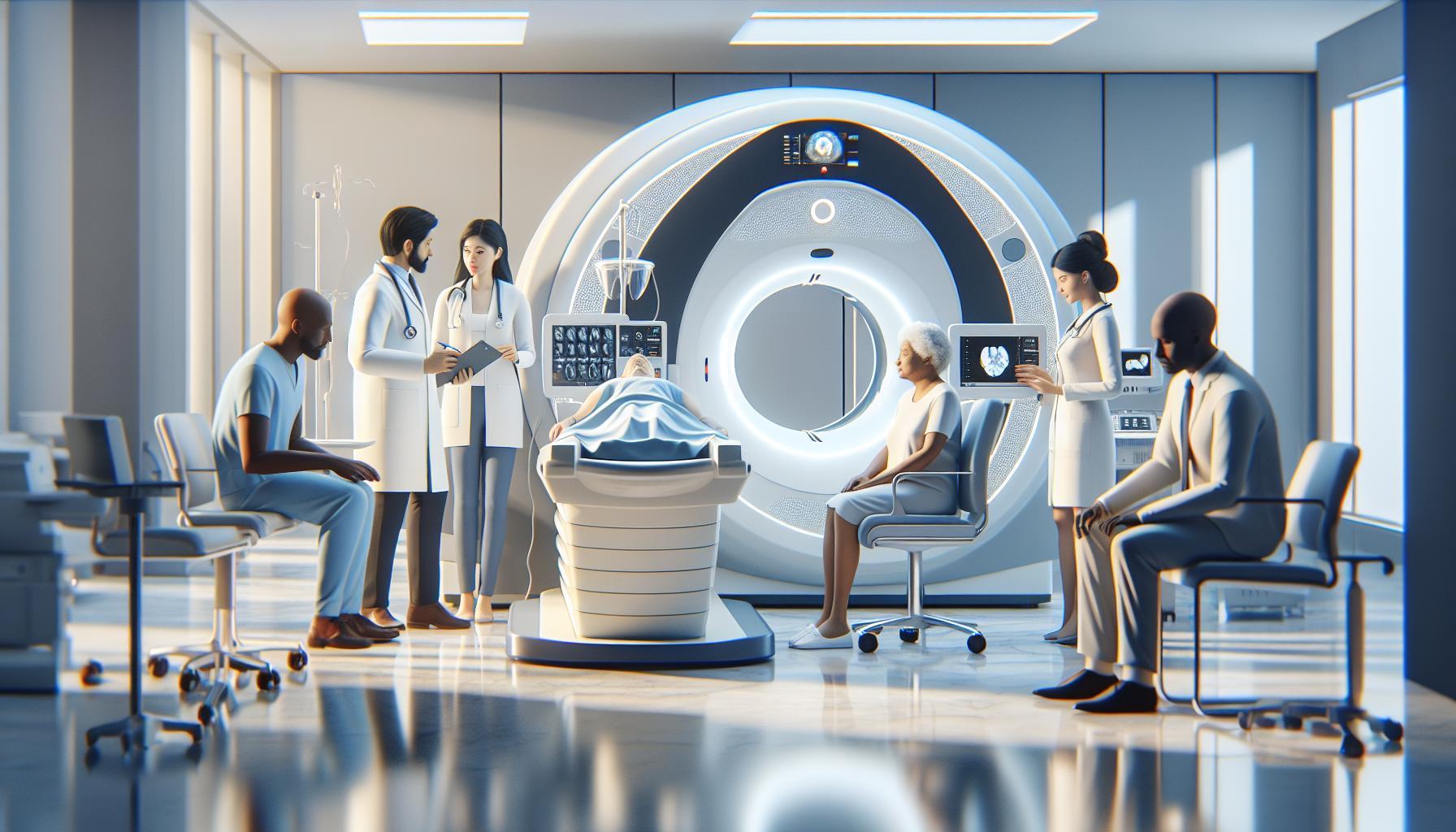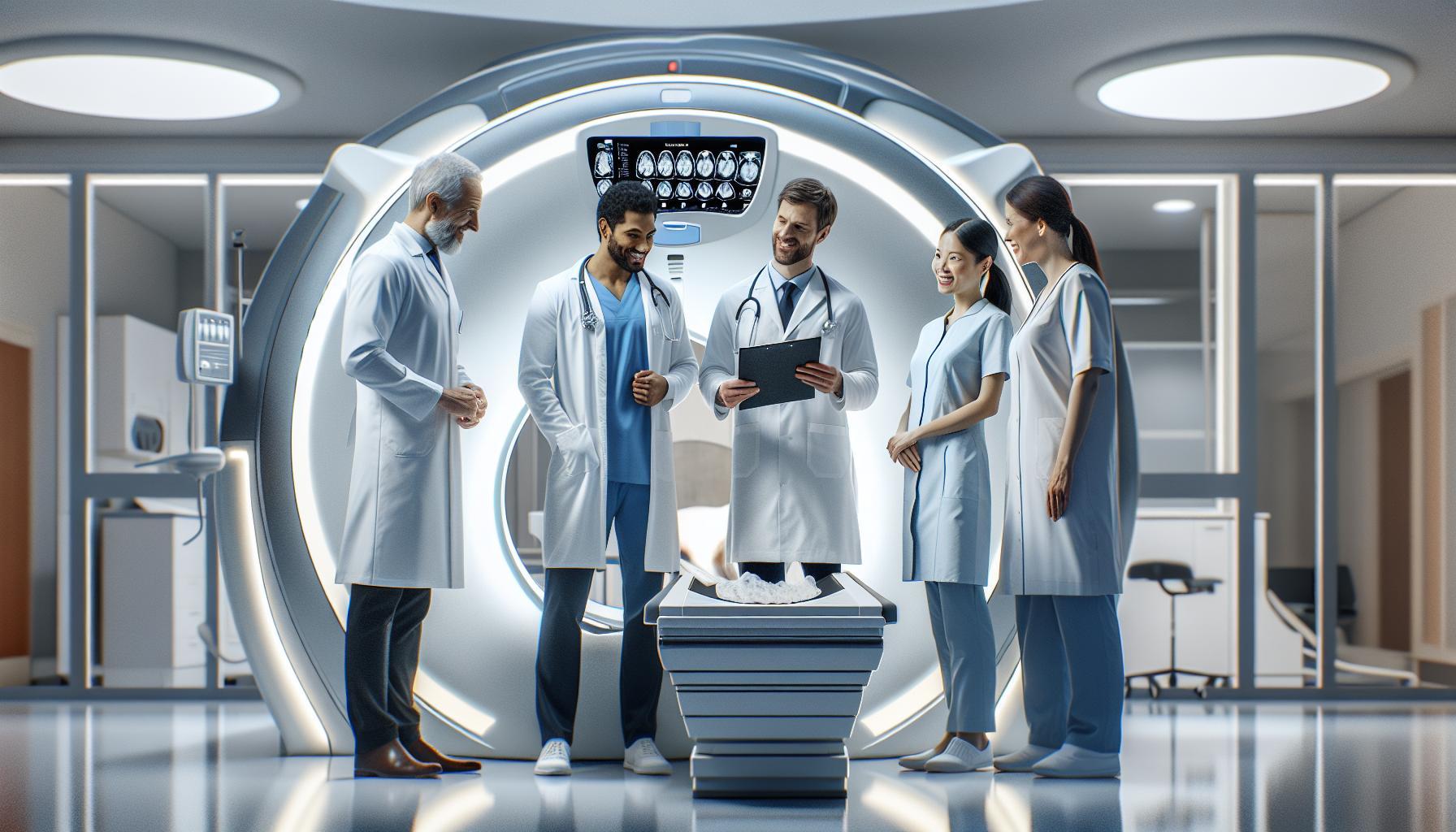When you’re advised to undergo a CT scan, it’s normal to have questions about the process, especially regarding how long it will take to receive results. Understanding the typical wait times and what you can expect can help alleviate anxiety and prepare you for the next steps in your healthcare journey.
A CT scan is a powerful imaging tool that provides detailed insights into your health, often impacting treatment decisions. Knowing what to expect not only empowers you as a patient but also helps you communicate effectively with your healthcare team. In this article, we will explore the factors that influence result wait times, what is considered “normal,” and how you can navigate the period between your scan and your results with confidence. Understanding these details will help make your CT scan experience smoother and less stressful.
How Long Does a CT Scan Take?
Undergoing a CT scan can feel daunting, but understanding how long the process takes can help alleviate some anxiety. Generally, a CT scan itself is a quick procedure, often lasting only about 10 to 30 minutes from start to finish. This time includes both the preparation before the scan and the actual imaging process. During the scan, you will lie on a movable table that slides through a large tube-shaped machine. The machine will take multiple images of your body, which can feel like a series of quick flashes or gentle whirring sounds.
Although the imaging is swift, it’s important to consider additional time factors. If you need to undergo any preparations-such as changing into a gown, having an intravenous (IV) line placed, or receiving a contrast dye-the overall process might take longer. Typically, this preparation can add another 15 to 30 minutes to your visit, primarily depending on the facility’s workflow and the specifics of your exam.
After your scan, it’s natural to wonder about your results. While the imaging may be prompt, the analysis can take longer, particularly if the images require review by a radiologist for thorough evaluation. Many facilities strive to have results ready within 1-2 days; however, some emergencies may push this timeline. Stay engaged with your healthcare team during your visit to understand the specifics of your situation, including any expected waiting times for your results. This proactive approach not only empowers you but also fosters a collaborative relationship with your healthcare providers, easing any uncertainties surrounding your CT scan experience.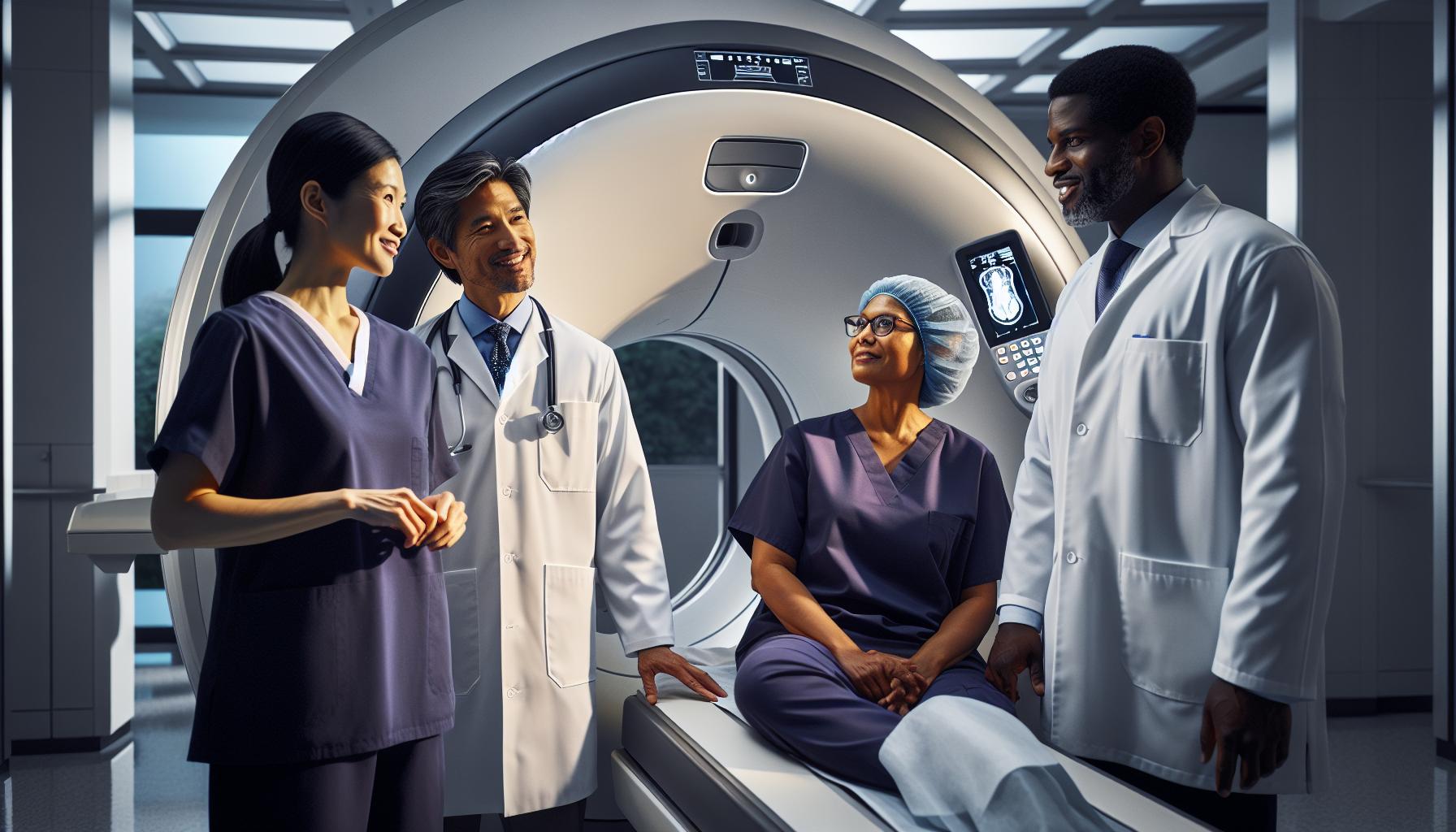
Understanding the CT Scan Process
Undergoing a CT scan is often a vital step in diagnosing various medical conditions, but understanding the process can help ease any anxiety surrounding it. A CT scan, or computed tomography scan, uses X-ray technology and sophisticated computer processing to create detailed images of the inside of your body. This diagnostic tool helps medical professionals visualize bones, organs, and tissues more clearly than traditional X-rays, leading to more accurate diagnoses.
The process typically begins with check-in and preparation, where a healthcare professional will inform you about what to expect. If your scan requires contrast material, you may need to drink it beforehand or receive it through an IV. This preparation phase can take 15 to 30 minutes. Once you’re ready, you’ll be positioned on a comfortable table that slides into the CT scanner-a large, doughnut-shaped machine. During the scan, you’ll need to remain as still as possible while the machine captures images. This part of the process is usually quick, taking just a few minutes.
After the scan, the images are sent to a radiologist, a doctor specialized in interpreting medical images, for analysis. The time it takes to receive results can vary widely based on several factors, such as the clinical urgency of the scan, the radiologist’s workload, and your healthcare facility’s processes. While some patients receive results within 1-2 days, others may wait longer, especially if additional reviews are needed.
Understanding this workflow empowers you to take an active role in your healthcare journey. If you’re anticipating a CT scan, don’t hesitate to ask your healthcare provider any questions about the procedure, expected wait times for results, or any concerns you may have regarding the use of contrast materials. This proactive communication can help alleviate any uncertainties and make the experience feel more manageable.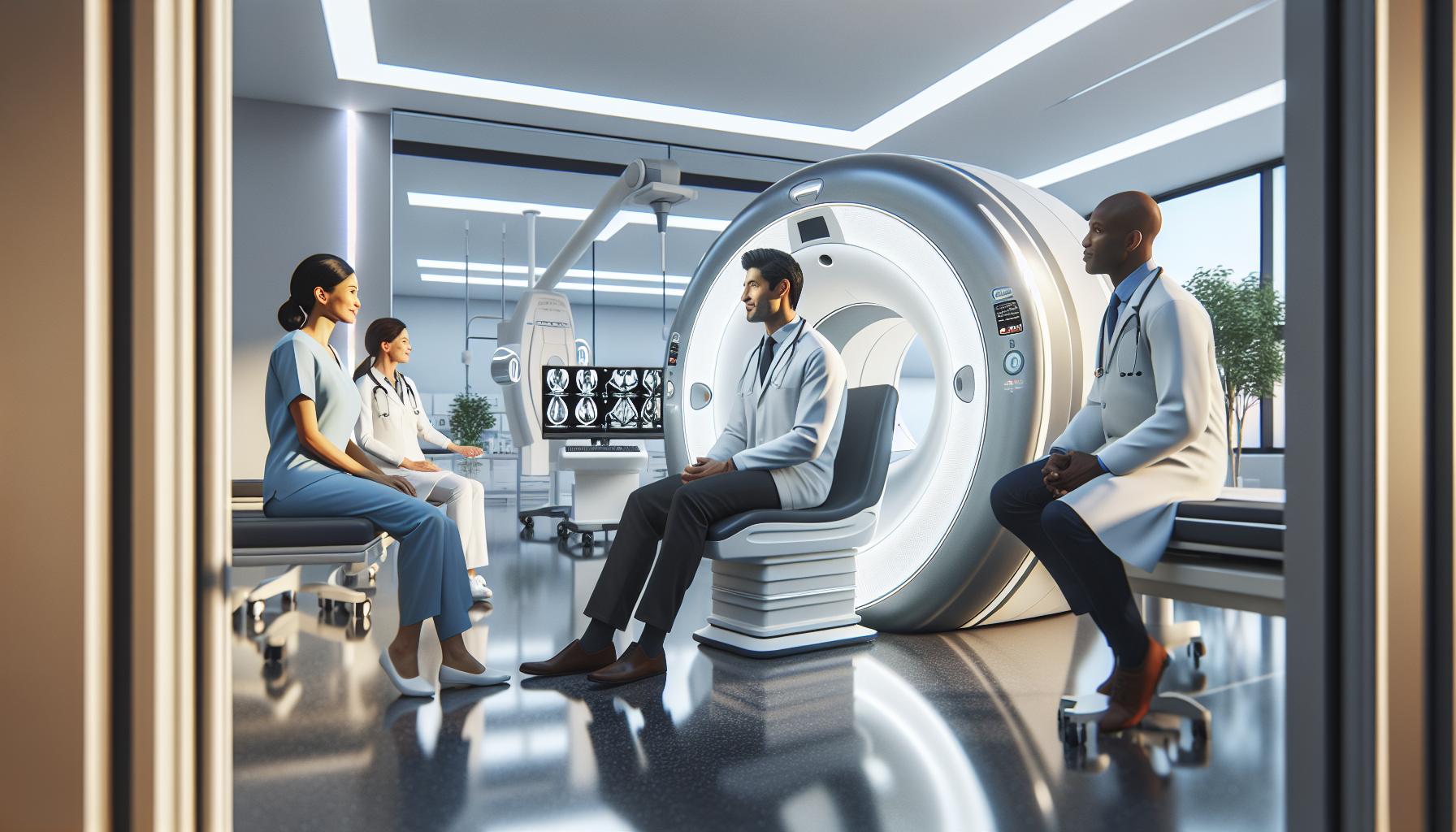
Typical Wait Times for CT Scan Results
After undergoing a CT scan, many patients are eager to understand when they can expect to receive their results. The anticipation can be nerve-wracking, especially for those seeking answers regarding their health. Generally, the wait time for CT scan results can range from a few hours to several days, depending on various factors. In some cases, urgent scans may be interpreted immediately, allowing for quicker feedback, while routine scans may require more time, sometimes up to a week, especially if the radiologist has a high volume of images to review.
Factors influencing this timeline include the healthcare facility’s protocols, the urgency of the scan, and the complexity of the images. For instance, if the scan is done in an emergency setting where immediate results are crucial, you may receive preliminary findings within hours. Conversely, for non-urgent procedures, the radiologist may need to conduct a more detailed analysis, extending the wait for results. Communication with your healthcare provider can clarify what to expect based on the specifics of your situation.
Once the radiologist has reviewed the images, they will prepare a report to share with your referring physician, who will then discuss the findings with you. This additional step in the process can affect your overall wait time, so it is important to stay informed and maintain open communication. If you feel anxious about waiting, consider reaching out to your healthcare provider for updates or guidance. Knowing what to expect can help ease your concerns while you await the results.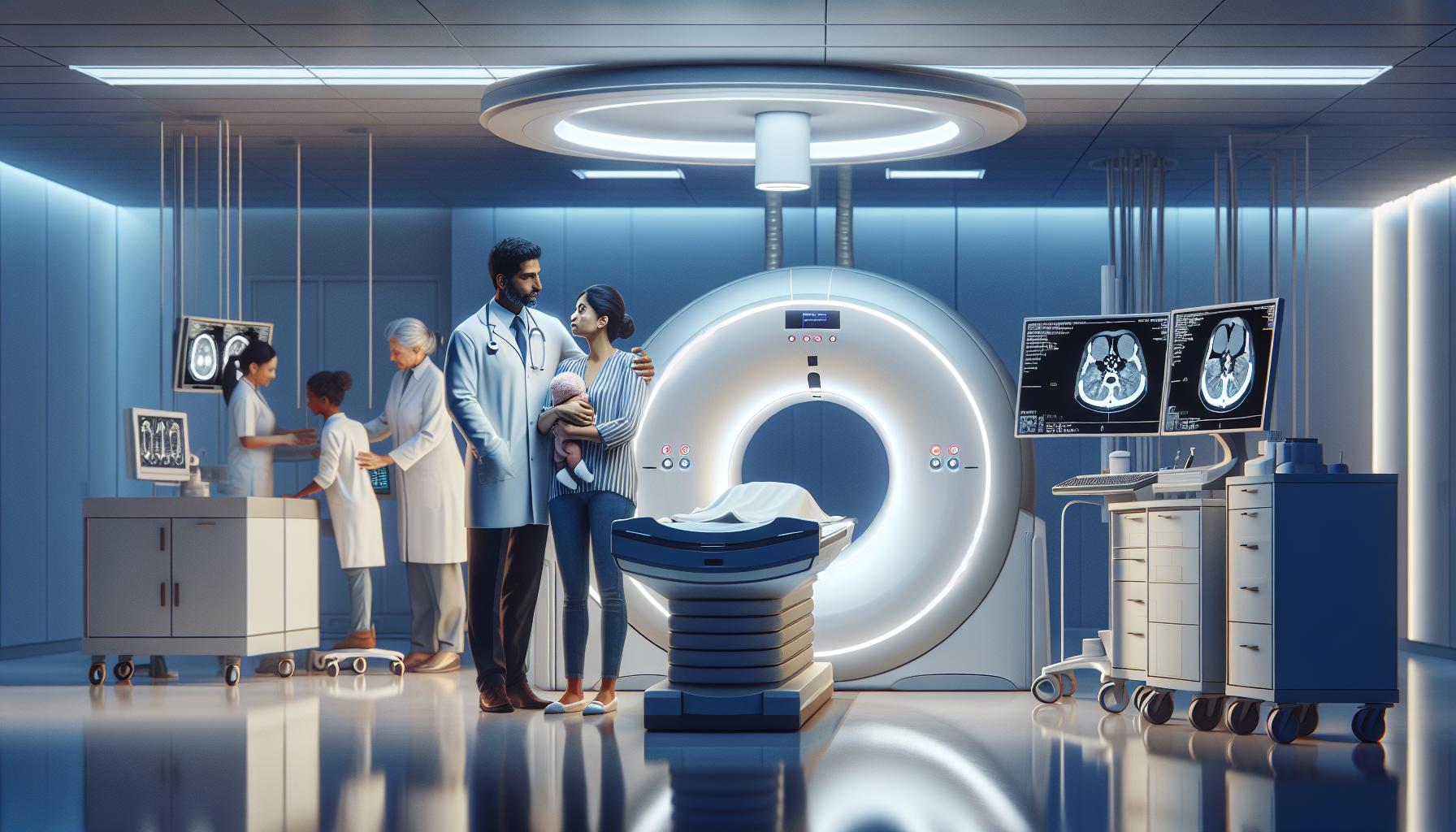
Factors Affecting CT Scan Result Timing
The timing of receiving results from a CT scan can be influenced by several pivotal factors that shape the course of your healthcare experience. Understanding these elements can empower patients to navigate the often anxious wait for results. One significant factor is the urgency of the CT scan. In emergency situations, where immediate medical intervention may be critical, radiologists usually prioritize these cases, leading to preliminary results that can often be communicated within hours. This swift turnaround is designed to facilitate urgent patient care, allowing healthcare providers to make timely decisions based on the findings.
Another critical element affecting result timing is the complexity of the imaging and the potential need for advanced analysis. Some scans may present straightforward images that can be quickly interpreted, while others, particularly those involving intricate anatomical regions or suspected pathologies, may require more thorough examination. Radiologists might need to review multiple images or track down additional information to ensure a comprehensive report. This detailed scrutiny can extend wait times, with results possibly taking days if the findings are elaborate or demand collaboration with other specialists.
Furthermore, the workflow and protocols of the healthcare facility play a crucial role. Different institutions have varying capacities for processing scans and disseminating results. In busier settings, a high volume of scans can create backlogs, delaying the final report’s delivery. Additionally, the communication protocols established between radiologists and referring physicians can impact how quickly results reach patients. Understanding these workflows can provide clarity on what to expect.
Lastly, patient engagement is an often-overlooked factor in this equation. Open communication with healthcare providers can greatly enhance the experience. Patients are encouraged to ask their doctors about the specific processes at their facility, which can give insights into expected wait times and reassure them about the steps in the results dissemination process. By being proactive, patients can alleviate some anxiety associated with the wait, fostering a better partnership in their healthcare journey.
What to Expect After Your CT Scan
After completing a CT scan, patients often find themselves wondering what comes next and what to anticipate during the waiting period. The experience can range from straightforward to somewhat anxious, depending on the individual’s health concerns and the urgency of the situation. Typically, after the scan, a radiologic technologist will review the images briefly to ensure they are of high quality and that no additional scans are needed. This step offers a reassuring moment, confirming that you have completed the necessary procedure.
Once the images are deemed satisfactory, they are sent to a radiologist for interpretation. During this time, it’s natural to feel a mix of hope and concern. Many facilities provide a general timeframe for how quickly results will be available, which can help set expectations. While some results can be shared within a few hours, particularly if the scan is urgent, others may take longer, possibly days, depending on various factors like complexity and the workload of the radiology department.
While waiting for results, it’s beneficial to focus on self-care and stay informed. Try to engage in relaxing activities, such as reading or mindfulness exercises, which can help alleviate anxiety. Additionally, consider keeping an open line of communication with your healthcare provider. If you have any questions or concerns, do not hesitate to reach out; they can give you updates regarding when to expect results or discuss what may happen next in your care plan.
It’s essential to acknowledge that the waiting can provoke worry, but understanding the process can provide comfort. Remember, the radiologist’s job is to ensure that the interpretation is thorough, which ultimately facilitates the best possible care for you. After receiving your results, arrange a follow-up consultation with your doctor to discuss the findings and any necessary next steps. This kind of proactive engagement not only helps in making informed decisions about your health but also fosters a collaborative relationship with your healthcare team.
The Role of Radiologists in Result Analysis
Understanding the core responsibilities of radiologists can help alleviate some of the anxiety you may feel while awaiting your CT scan results. Radiologists are highly trained medical professionals who specialize in interpreting medical images, such as those produced by CT scans. Their expertise is crucial in diagnosing conditions, guiding treatment plans, and ensuring effective patient care. After your CT scan, the images are forwarded to a radiologist, who meticulously examines them for any abnormalities or significant findings.
The radiologist’s analysis involves a careful review of the images, focusing on identifying any potential issues related to organs, tissues, and structures being examined. They use their extensive training to differentiate between normal and abnormal findings, which may not always be immediately obvious. This step is essential for accurate diagnosis, as it ensures that even subtle signs of health conditions are considered. The process can be intricate; it may involve cross-referencing with prior scans, correlating findings with clinical history, and sometimes consulting with other specialists to provide a comprehensive overview.
Once the analysis is complete, the radiologist prepares a report summarizing their findings, which is then sent to your healthcare provider. Typically, this report might include detailed observations, possible diagnoses, and recommendations for follow-up tests or treatments if needed. This communication is vital, as it directly impacts your subsequent care. Remember, it’s common for concerns to arise during this waiting period; however, knowing that a skilled professional is thoroughly examining your images can provide peace of mind.
It’s important to maintain open communication with your healthcare provider regarding when you can expect to receive the results. They can offer reassurance about the timelines and what is involved in the analysis process. If there are any emergent findings, they will notify you promptly, allowing for timely intervention if necessary. Engaging actively with your provider can not only help clarify concerns but also prepare you for the next steps in your healthcare journey.
Common Reasons for Delayed CT Scan Results
The anticipation and anxiety of waiting for medical test results, such as a CT scan, can be overwhelming for many patients. Understanding the intricacies of why delays might occur can help ease some concerns and foster a sense of empowerment in navigating the healthcare experience. Various factors can contribute to the extended timelines for obtaining CT scan results, and being aware of these can provide clarity.
One common reason for delayed results is the workload faced by radiologists. On busy days, a radiologist may have to review numerous scans, leading to longer wait times for any single report. Institutions with a high patient volume or fewer radiology staff may experience more significant delays. Additionally, the complexity of the scan plays a role; more intricate scans require additional time for thorough analysis. For instance, if the CT scan is related to a complicated medical issue or if it necessitates correlation with previous imaging or additional lab tests, the process may be naturally prolonged.
Communication issues can also cause delays. After the radiologist completes their report, it needs to be communicated effectively to the referring physician, who might then need to schedule an appointment or call the patient to discuss the results. If there are any discrepancies or concerns regarding the findings, additional consultations between specialists may be required, thus extending the waiting period. Furthermore, in some instances, the radiologist might identify an abnormality that necessitates further investigation or imaging, adding to the time before results are communicated to the patient.
Lastly, technical factors related to the technology or software used in imaging can also lead to delays. If the CT system experiences a malfunction or if there are issues transferring images, it can stall the review process. While these types of delays are often unforeseen, they underscore the importance of the careful handling of your medical information.
In the face of these potential delays, maintaining open lines of communication with your healthcare provider can significantly alleviate anxiety. Asking about expected timelines for results, understanding the necessity for thorough analysis, and expressing your concerns can help manage your expectations. Remember, the aim is always to ensure accuracy and safety in your diagnosis and treatment.
How to Access Your CT Scan Results
Accessing your CT scan results can sometimes feel like navigating a maze of medical jargon and procedures, but understanding the process can help ease your anxiety. After your scan is complete, the images will be analyzed by a radiologist who specializes in interpreting diagnostic imaging. Once they evaluate the scans, they will generate a report detailing their findings, which is then sent to the physician who ordered the test.
It’s important to consult your healthcare provider regarding how to access your results. Many hospitals and clinics now offer patient portals-secure online systems where you can view your medical information, including test results. If your facility provides this option, establishing an account is often straightforward and allows you to access your results as soon as they are available, typically within a few days after the scan.
If you don’t have online access or prefer a more personal touch, you can request your results through direct communication with your healthcare team. It’s advisable to call your doctor’s office directly; the staff can guide you through the process and answer any questions you may have regarding the timeline or the specific content of your results. Sometimes, they may schedule a follow-up appointment to discuss the findings in detail, providing you with the opportunity to ask questions and understand the implications fully.
In the event of any delays or issues in accessing your results, remain proactive. Don’t hesitate to inquire about the status and express any concerns you may have about waiting for important health information. Remember, your health is paramount, and maintaining open communication with your healthcare professionals is key to ensuring that you receive timely and accurate updates about your imaging results.
Tips for Preparing for Your CT Scan
Preparing for a CT scan can be a straightforward process, but ensuring you’re well-prepared can help alleviate any apprehension you might feel about the procedure. A little knowledge goes a long way, and there are several simple steps you can take to make your experience smoother and more comfortable.
First and foremost, it’s crucial to follow any specific instructions provided by your healthcare provider. Depending on the type of CT scan you are scheduled for, you may be asked to adjust your diet, particularly if the scan involves your abdomen or pelvis. For instance, fasting for a few hours prior to the scan may be necessary to ensure optimal image clarity. If you are required to consume a contrast agent-commonly used in scans to enhance visibility of certain areas-make sure to inquire about how to take it and whether you need to stay at the facility for observation after.
Understanding Medications and Allergies
Another important aspect of preparation is communication. Be sure to inform your healthcare provider about any medications you are taking and any allergies you may have, especially to iodine, which is typically used in contrast materials. This information is vital for your safety and will help the medical team determine the best course of action for your scan.
You should also dress comfortably for your appointment. Wearing loose-fitting clothing can make it easier for you to change into a hospital gown if needed, and you’ll appreciate the comfort during the process. Additionally, leave behind any jewelry or accessories that may interfere with the imaging process; these items can usually be stored safely at the facility.
Lastly, consider bringing a support person if you feel uneasy about the scan. Having someone to accompany you can provide emotional support and help reduce anxiety. Remember, the staff at the imaging center are there to assist you, answer your questions, and ensure that you have a positive experience. By taking these preparatory steps, you can enter the CT scan confidently, knowing you’re informed and ready for what lies ahead.
The Importance of Discussing Results with Your Doctor
It’s natural to feel anxious while waiting for the results of a CT scan, but discussing those results with your doctor can significantly alleviate your concerns and aid in your understanding of what’s next. Engaging in an open dialogue about your CT scan findings ensures that you receive personalized explanations tailored to your specific health situation. Your doctor can clarify what the images show, discuss any implications for your health, and detail the subsequent steps required for treatment or further evaluation if necessary.
When scheduling your appointment to go over results, prepare a list of questions or points you wish to discuss. This practice not only makes the most of your time with your doctor but also helps ensure that you leave the appointment feeling informed and supported. Consider questions such as:
- What do the results indicate about my condition?
- Are there additional tests recommended based on these results?
- What treatment options are available, and what do they entail?
Understanding the outcomes of your CT scan is crucial for both peace of mind and effective healthcare management. Clear communication with your healthcare provider can bridge the gap between uncertainties and actionable medical advice, empowering you to take charge of your health journey. This collaboration will foster a supportive environment where you feel comfortable addressing fears or misconceptions, creating a pathway toward better health outcomes.
Moreover, it’s important to remember that not all results will indicate serious health issues. Sometimes, a scan may reveal reassuring findings, allowing you to move forward with confidence. In cases where further analysis is required, knowing that your doctor is there to guide you through the process can significantly reduce the stress associated with unexpected medical news. Make it a point to have these discussions, ensuring that you and your doctor are aligned in understanding your health needs moving forward.
CT Scans and Emergency Situations: What to Know
In emergency situations, the role of CT scans can be vital, often serving as the first line of defense in diagnosing conditions that require immediate attention. Understanding the process and timeline involved can help alleviate some of the anxiety associated with urgent healthcare needs. When a patient arrives at an emergency department with symptoms that may indicate a serious issue-such as severe abdominal pain, trauma from an accident, or signs of stroke-a CT scan is frequently utilized to provide rapid imaging that can guide treatment decisions.
The speed at which a CT scan is performed typically ranges from 10 to 30 minutes, depending on the specific area being scanned and the urgency of the situation. However, while the procedure itself is quick, results may take longer, particularly in busy emergency departments where multiple patients may require imaging at once. The initial scan can often be assessed in real-time by on-site radiologists or emergency physicians, providing immediate insights that can influence critical decisions regarding patient care.
Patients and their families may worry about the time it takes to receive further analysis or confirmation of results. It’s important to remember that communication is key during these stressful times. Healthcare professionals strive to ensure that patients understand what to expect and are kept informed about the next steps. If you or a loved one is in an emergency situation requiring a CT scan, it’s beneficial to ask questions such as:
- How long will it take to get my results?
- What does this scan help us identify?
- What are the potential next steps based on the findings?
In emergencies, the clarity of the findings can significantly impact treatment decisions, underscoring the importance of timely imaging. As challenging as these moments can be, having a clear understanding of the CT scan process in the context of urgent care can empower patients to remain engaged in their health journey while waiting for results. It cultivates an environment in which informed discussions can occur between healthcare providers and patients, ultimately guiding the patient toward the appropriate care needed.
Patient Stories: Experiences with CT Scan Wait Times
Experiences surrounding CT scan wait times can vary widely, reflecting both the urgency of individual cases and the institution’s efficiency. One patient, Sarah, vividly remembers the whirlwind of emotions when she was rushed to the emergency room after experiencing intense chest pain. The CT scan, performed quickly, lasted only about 15 minutes. However, the subsequent wait for results felt interminable. “It was the longest 45 minutes of my life. I remember looking at the clock repeatedly, anxious about what the next steps would be,” she shared. Sarah’s experience highlights a common challenge: while the imaging process itself is efficient, the wait for analysis can induce significant stress.
The reasons for these wait times often stem from a combination of factors, including the volume of patients being processed and the complexity of the scans. In busy hospitals, radiologists may handle a backlog, prioritizing urgent cases first. For instance, during peak hours, John, another patient, noted that he waited over an hour to hear back about his scan results, even though his procedure was completed swiftly. “I kept thinking about what might be wrong and just wanted to hear that everything was okay,” he recounted. This reflects a crucial aspect of the patient experience: the need for timely communication from healthcare providers, which can alleviate anxiety.
It’s important for patients to remember that behind the scenes, radiologists are diligently working to ensure accuracy and thoroughness in their assessments. Despite the frustration of waiting, patients are encouraged to engage with their healthcare teams. Asking questions about the expected timeline and the nature of the findings can provide insights and ease uncertainty. Communication is key; healthcare professionals are there to provide support during these anxious moments.
Understanding these stories can empower patients facing similar situations. Preparing emotionally for possible delays, seeking clarity about procedures, and remaining proactive in communication can turn a potentially stressful experience into a more manageable one. Remember, while waiting for results can be unnerving, you’re not alone, and the healthcare team is on your side, working to provide the best care possible.
Frequently asked questions
Q: How long after a CT scan do you usually get results?
A: Typically, you can expect to receive the results of a CT scan within 24 to 48 hours. However, this timing can vary based on the radiologist’s workload and the complexity of the scan. Be sure to check with your healthcare provider for specific timelines related to your results.
Q: What factors can delay CT scan results?
A: Factors that can delay CT scan results include high patient volume, complex cases requiring in-depth analysis, or even technological issues with the imaging equipment. It’s essential to stay in touch with your healthcare provider to understand any delays.
Q: Can you get CT scan results the same day?
A: Yes, in some cases, you might receive CT scan results on the same day, especially if the scan is part of an emergency evaluation. Always ask your healthcare provider about the expected timeline for your specific situation.
Q: What happens if CT scan results are inconclusive?
A: If CT scan results are inconclusive, your doctor might recommend additional imaging tests or procedures for further clarity. Discussing the next steps with your healthcare provider is crucial for a comprehensive understanding of your health.
Q: How can I access my CT scan results?
A: You can typically access your CT scan results through your healthcare provider’s patient portal, by contacting your doctor’s office, or via direct mail. Always verify your options by checking in with your healthcare provider.
Q: Should I talk to my doctor before seeing my CT scan results?
A: Yes, it is advisable to discuss your CT scan results with your doctor first. They can provide context, explain the findings, and discuss any necessary follow-up actions based on the results.
Q: What if I have questions about my CT scan results?
A: If you have questions about your CT scan results, don’t hesitate to reach out to your healthcare provider. They can clarify any concerns and provide more detailed information tailored to your specific needs.
Q: What should I keep in mind while waiting for CT scan results?
A: While waiting for CT scan results, it’s essential to stay calm and avoid overthinking potential outcomes. Consider discussing any concerns with your healthcare provider, who can offer you reassurance and guidance during the waiting period.
In Conclusion
Understanding how long it takes to receive results from a CT scan can significantly reduce anxiety about the process. Remember, results typically range from a few hours to a few days, depending on various factors like the type of scan and your healthcare provider’s protocols. If you’re still feeling uncertain, don’t hesitate to reach out to your healthcare team-they’re there to help you navigate this process.
For further insights, consider exploring our articles on “Preparing for Your CT Scan” and “Understanding Medical Imaging Procedures,” which can provide additional context and assurance. Don’t miss out on the latest updates in the medical field by signing up for our newsletter. Your journey to understanding CT scans and their results starts here; empower yourself with the knowledge you need for better healthcare decisions!



